Introduction: Nutrition as a Cornerstone of Recovery
The integration of nutritional strategies plays a pivotal role in enhancing recovery outcomes at New Horizons Centers. Whether it’s supporting those recovering from addiction, mental health disorders, or physical injuries, nutrition offers a holistic approach that complements therapeutic interventions. This article explores how balanced dietary choices can facilitate the healing process and stabilize both physical and mental health within the recovery journey.
Holistic Approaches to Addiction Recovery Through Nutrition
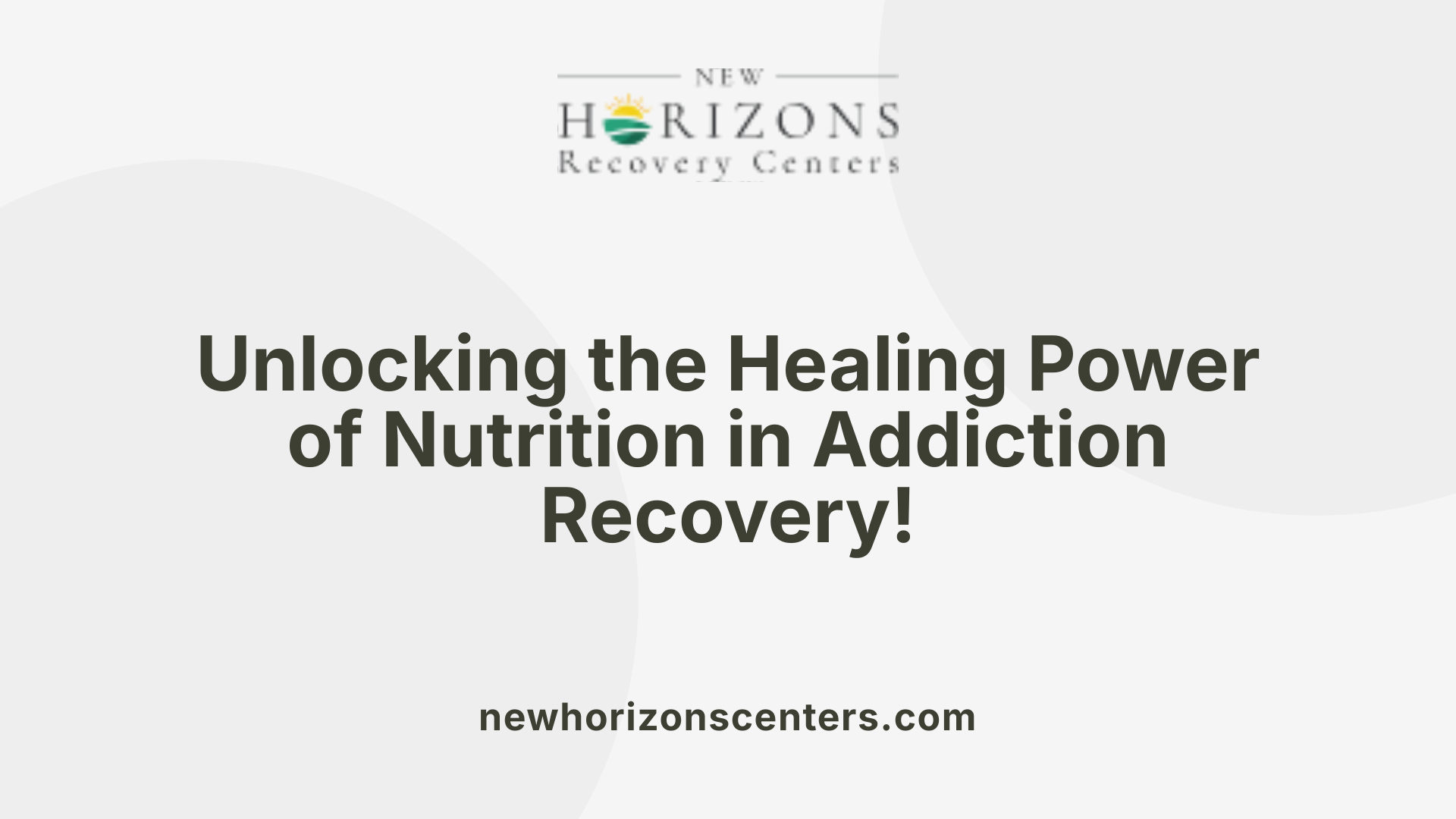
What is the significance of nutrition in the recovery process from addiction and mental health issues?
Nutrition plays a pivotal role in the recovery journey for those battling addiction and mental health issues. Proper nutrition aids in repairing the body’s systems affected by substance abuse, while also enhancing mood and optimizing cognitive functions. During active addiction, individuals often suffer from nutrient deficiencies, which can compound existing physical and psychological problems.
A balanced diet, rich in whole foods like fruits, vegetables, lean proteins, and whole grains, is essential for this recovery phase. These foods help restore nutrient levels, supporting overall health and aiding in the replenishment of vital elements that might have been depleted. For example, increased protein intake can combat muscle atrophy, while healthy fats such as Omega-3 fatty acids provide anti-inflammatory benefits.
Combating nutrient deficiencies in recovery
Combatting nutrient deficiencies starts with a personalized approach to nutrition. Facilities like Horizon Nutrition Counseling utilize tailored meal plans to address individual needs and preferences, encouraging clients to embrace whole foods that foster healing. They work collaboratively with experts in physical therapy, combining nutrition with rehabilitation practices to expedite recovery.
Here’s how specific nutrients contribute to recovery:
| Nutrient Type | Benefits for Recovery | Recommendations |
|---|---|---|
| Protein | Helps rebuild muscle mass and strength | Include nuts, seeds, fish, eggs, poultry |
| Healthy Fats | Reduces inflammation and pain | Integrate fish oil, avocados, olive oil |
| Vitamins & Minerals | Support brain function and mood stability | Prioritize fresh produce and whole grains |
In summary, a strategic focus on nutrition not only aids in physical recovery but also helps establish healthier habits essential for maintaining long-term sobriety. This holistic approach intertwines dietary health with mental wellness, creating a comprehensive support system for individuals in recovery.
Nutrition's Influence on Mental Health Restoration
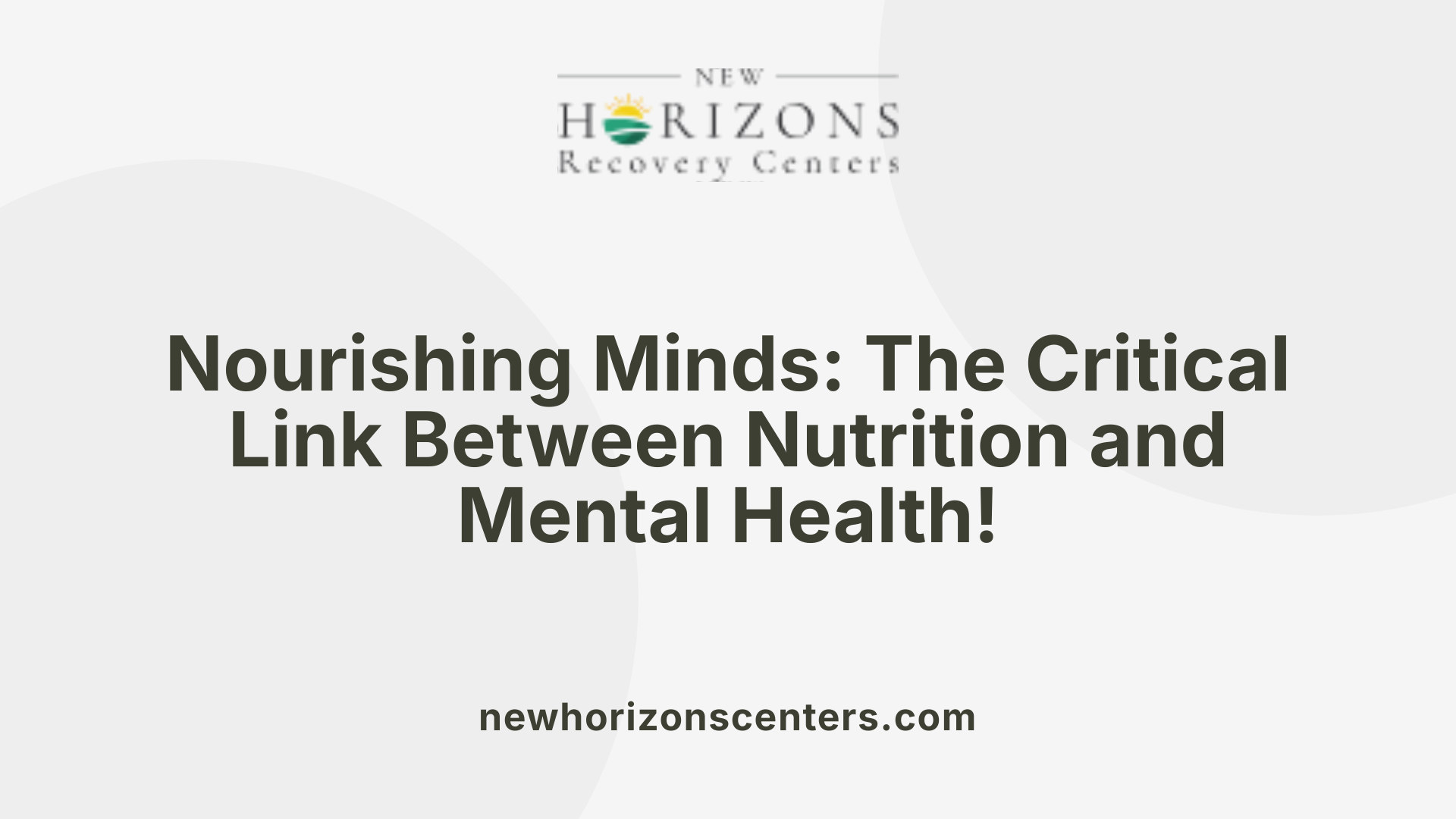
Nutritional needs in mental health recovery
Proper nutrition is crucial during mental health recovery as it supports both physical health and emotional well-being. Balanced meals rich in whole foods—like fruits, vegetables, and lean proteins—help individuals stabilize their mood and improve cognitive function. Nutritional deficiencies are common among those overcoming addiction, making it necessary to focus on enriching their diets with essential vitamins and minerals.
For example, certain nutrients are known to play a significant role in brain health. Omega-3 fatty acids found in fish, or avocados, can aid in reducing inflammation and pain, which are often exacerbated during recovery. Moreover, increasing protein intake supports rebuilding muscle strength, particularly after physical stress from withdrawal or surgery, which is essential for comprehensive recovery.
Role of diet in emotional stability
Nutrition directly affects mental health by improving organ function and metabolism while stabilizing mood. Structured meal plans are beneficial; they can minimize cravings and foster a healthier relationship with food. Individuals recovering from substance use may encounter side effects such as nausea and appetite loss, where easy-to-digest foods become vital.
Encouraging sustainable dietary habits, like maintaining a substance-free environment and ensuring adequate sleep, promotes long-term sobriety and emotional stability. The interdisciplinary approach taken by facilities like New Horizons Centers integrates nutrition counseling, which not only focuses on physical recovery but also enhances emotional support during the recovery journey.
The Essential Role of Nutrition in Physical Rehabilitation
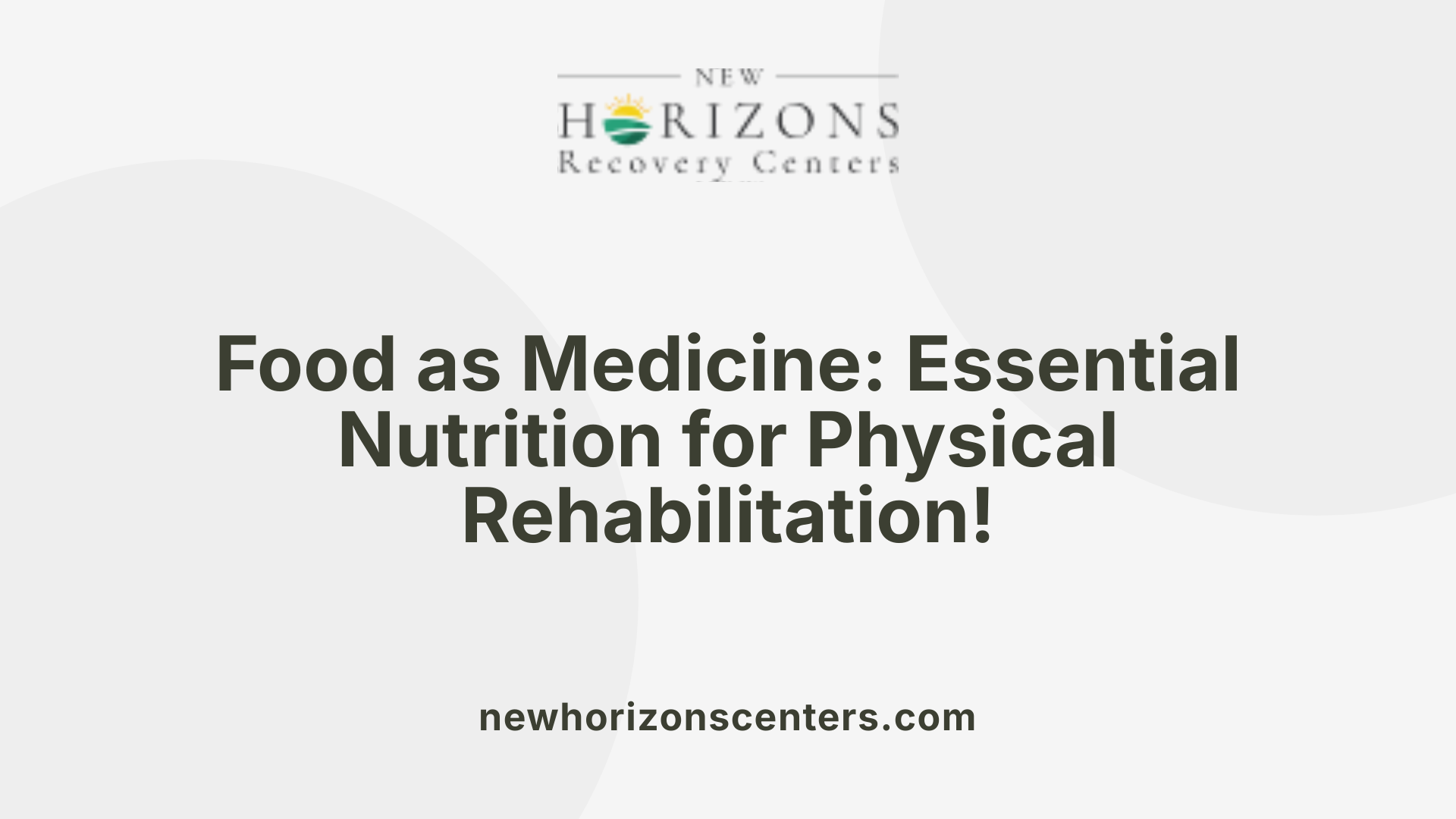
Diet Insights for Injury Recovery
Nutrition serves as the foundation for effective physical recovery from injuries. A balanced diet that emphasizes whole foods—like fruits, vegetables, lean proteins, and whole grains—supplies the necessary nutrients to aid in healing. It's essential to consider the role of specific dietary elements that can bolster recovery:
- Protein: Increased protein intake is vital for repairing muscle fibers and combating muscular atrophy. Foods rich in protein, such as nuts, seeds, fish, eggs, and poultry, are recommended during rehabilitation.
- Calcium: This mineral is crucial for individuals recovering from fractures, ensuring that the heightened calcium needs are met.
- Hydration: Staying well-hydrated boosts immune function, which is pivotal for a robust recovery.
Anti-Inflammatory Foods in Healing
Adopting a diet rich in anti-inflammatory foods plays a significant role in the recovery process. Foods that reduce inflammation and promote healing include:
- Colorful Fruits and Vegetables: These foods are packed with anti-oxidants that support tissue repair.
- Healthy Fats: Sources like Omega-3 fatty acids found in fish oil, avocados, and olive oil are particularly beneficial for reducing inflammation and pain.
Incorporating these elements into daily meals can significantly enhance recovery outcomes, making nutrition a central aspect of injury rehabilitation.
Dietary Choices: A Pillar in Older Adult Recovery Programs
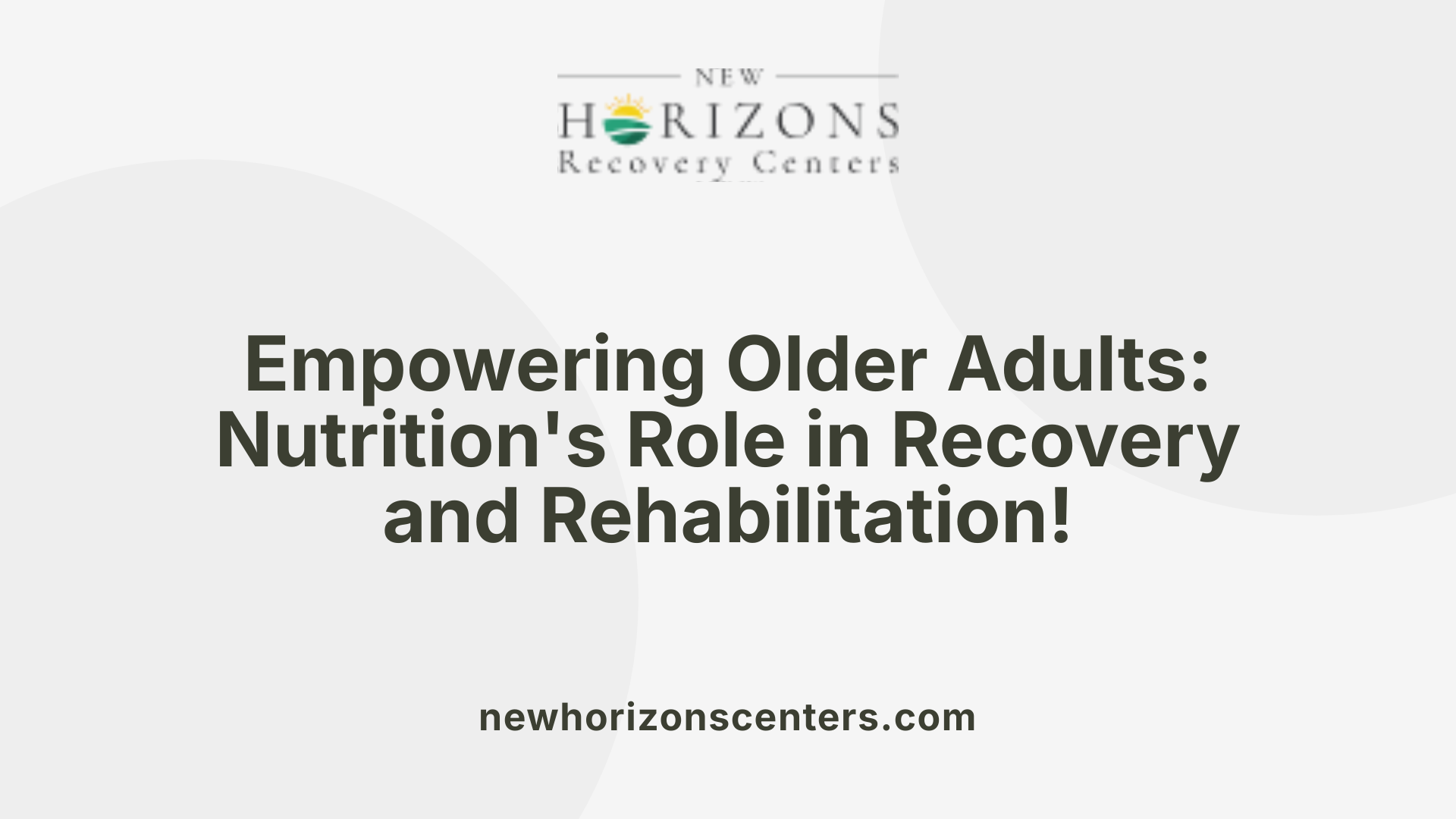
Why is nutrition important for rehabilitation and recovery?
Nutrition plays a crucial role in rehabilitation and recovery, especially for older adults. A well-balanced diet ensures the body receives essential nutrients necessary for healing. After experiencing the toll of substance abuse, older adults often face nutrient deficiencies that can harm their physical and mental well-being.
By focusing on proper nutritional services, facilities like New Horizons emphasize meal planning that supports recovery. Good nutrition can reduce detox periods and ease withdrawal symptoms.
Moreover, maintaining a nutritious diet can stabilize mood, which is vital for mitigating mental health risks, including depression and anxiety.
When personalizing meal plans, incorporating whole foods such as fruits, vegetables, lean proteins, and whole grains becomes essential. These foods promote not only physical healing but also emotional and cognitive recovery, fostering a holistic approach to well-being.
Facilities dedicated to this cause provide tailored nutritional counseling, collaborating with dieticians and therapists to enhance recovery outcomes. Such interdisciplinary strategies ensure that older adults receive comprehensive support in their recovery journeys.
The Synergistic Role of Community and Nutrition in Recovery
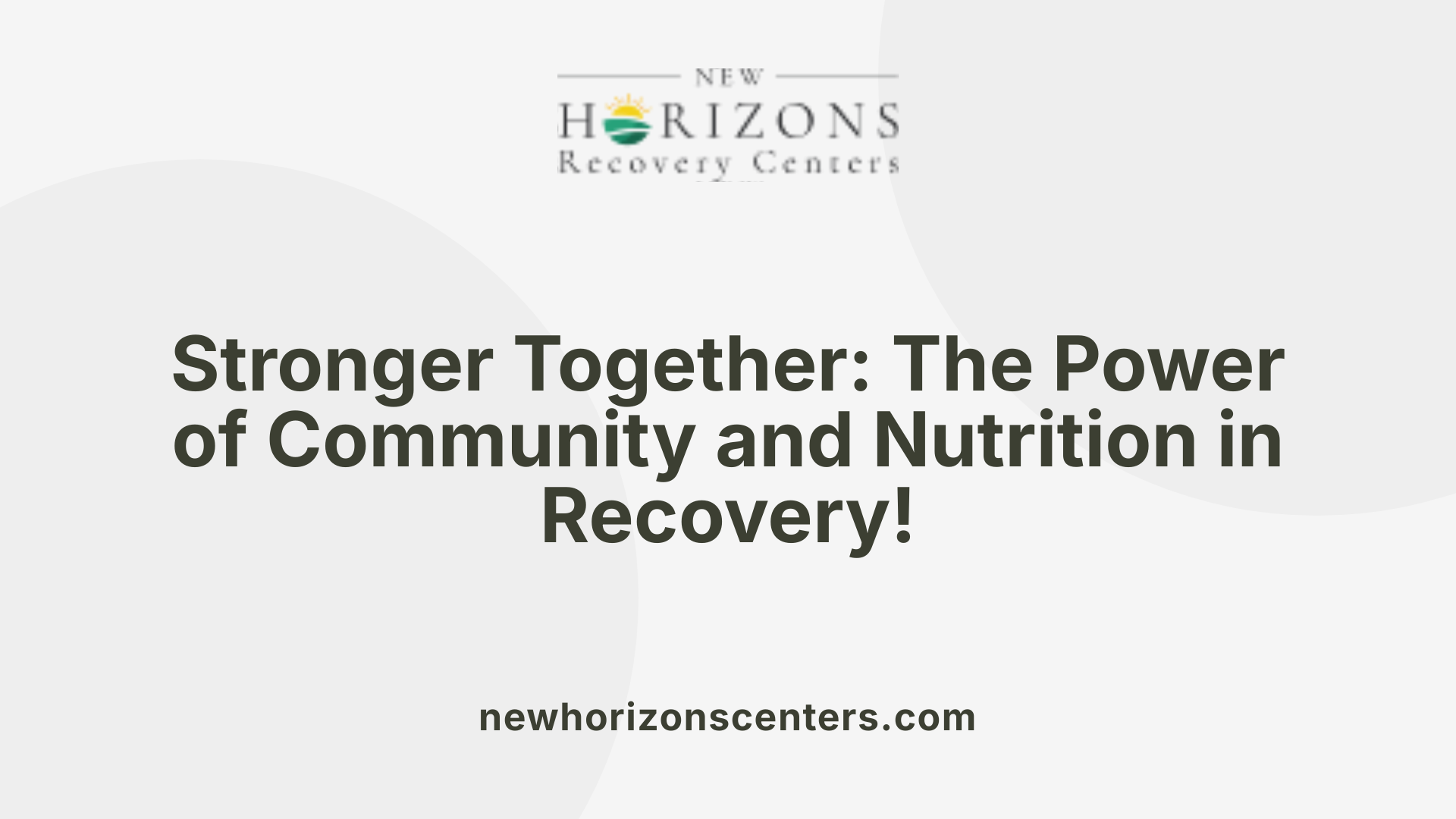
Community Involvement in Recovery
Community engagement is a powerful element in the recovery process. It fosters a sense of belonging and purpose, crucial for those overcoming addiction. By participating in local support groups or community initiatives, individuals can reduce feelings of isolation, enhancing their journey to sobriety. Mutual support within a community builds empathy, creating an environment where individuals are heard and understood.
Nutritional Counseling and Support Systems
Nutrition plays an integral role in recovery, with specialized counseling being a key component of successful programs. Services like those offered by Horizon Nutrition Counseling not only address eating disorders but also promote a healthy relationship with food, vital for rebuilding physical and mental health. Personalized meal plans focusing on whole foods — fruits, vegetables, lean proteins, and healthy fats — aid in healing and recovery. Furthermore, collaborating with healthcare professionals, including dieticians and therapists, forms a supportive network essential for effective rehabilitation, aiding individuals achieve long-term sobriety.
Scientific Insights on Nutrition's Role in Recovery
Evidence-based practices in nutrition
Proper nutrition is a cornerstone of effective recovery from addiction and physical ailments. A balanced diet rich in whole foods such as fruits, vegetables, lean proteins, and whole grains is crucial. These food groups support both mental and physical health, promoting faster recovery outcomes.
Nutrition counseling can provide tailored meal plans focusing on specific nutrients that aid recovery, such as increasing protein intake from sources like fish, nuts, and lean meats. This approach not only combats muscular atrophy during physical therapy but also enhances overall strength and recovery times.
Interdisciplinary approaches for improved outcomes
Collaboration among healthcare professionals, including dieticians, nutritionists, and therapists, plays a vital role in holistic recovery. Facilities like Horizon Nutrition Counseling apply trauma-informed methods, integrating comprehensive support structures for those recovering from addiction or physical health issues.
Community involvement further enhances recovery success as it fosters a sense of belonging. Together, these interdisciplinary strategies significantly improve the likelihood of long-term sobriety and healing.
Conclusion: Crafting a Path to Holistic Healing
At New Horizons Centers, nutrition is integral to recovery programs, underscoring its importance across various treatment pathways. By emphasizing the role of balanced diets and providing personalized nutritional counseling, New Horizons empowers individuals to reclaim their health and well-being. As recovery continues to evolve into a more comprehensive field, nutrition remains a critical element, offering sustained support and enriching the lives of those in pursuit of a healthier future.
References
- Ways to Be Supportive of Recovery
- Horizon Nutrition Counseling: Dietitian Nutritionists Nashville TN
- The Role of Nutrition in Physical Therapy Treatment
- New Horizons | Addiction treatment center in MO
- Importance of Nutrition in Recovery - Hanley Foundation
- Nutrition and Addiction Recovery: Eating Healthy in Sobriety
- Nutrition in Recovery: Embracing Fresh Fruits & Vegetables

-ink.jpeg)
-ink.jpeg)
-ink.jpeg)
-ink.jpeg)
-ink.jpeg)
-ink.jpeg)
